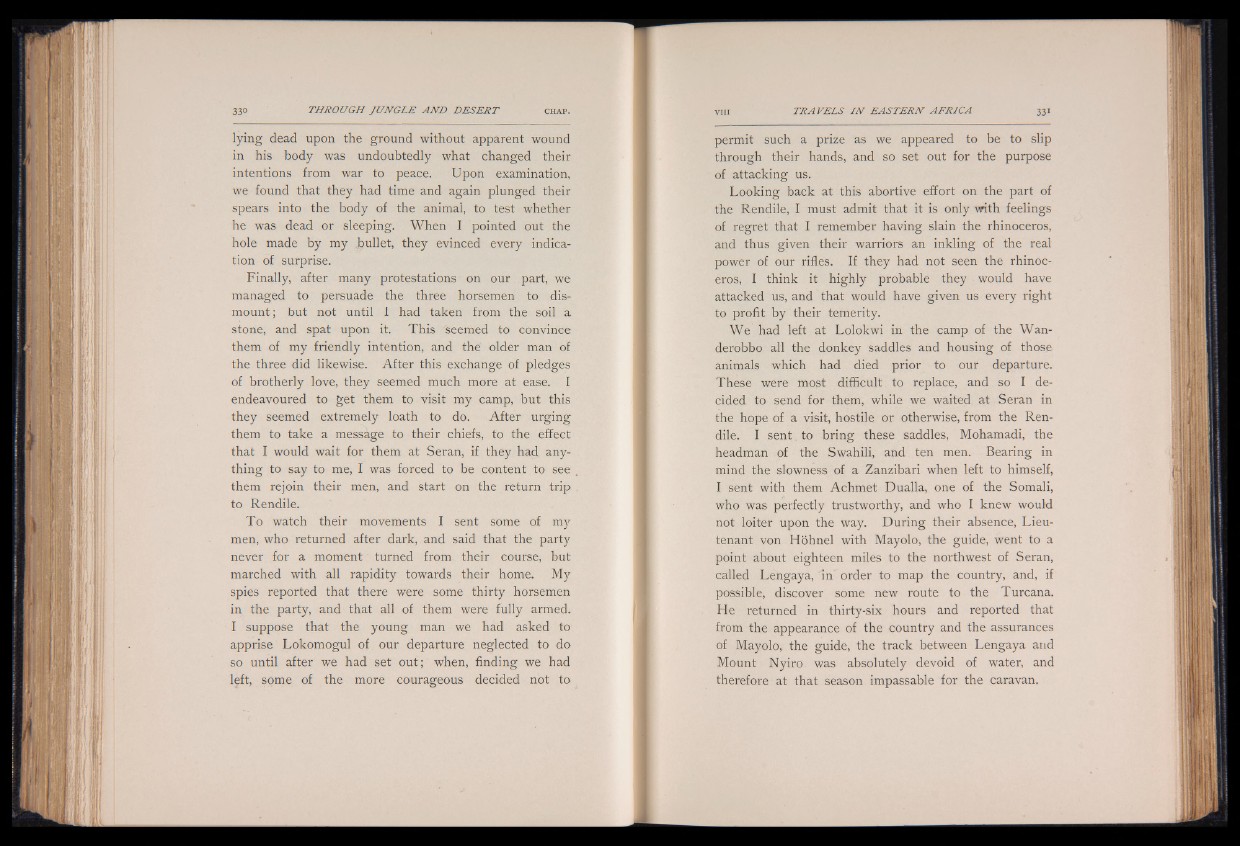
lying dead upon the ground without apparent wound
in his body was undoubtedly what changed their
intentions from war to peace. Upon examination,
we found that they had time and again plunged their
spears into the body of the animal, to test whether
he was dead or sleeping. When I pointed out the
hole made by my bullet, they evinced every indication
of surprise.
Finally, after many protestations on our part, we
managed to persuade the three horsemen to dismount;
but not until I had taken from the soil a
stone, and spat upon it. This seemed to convince
them of my friendly intention, and the older man of
the three did likewise. After this exchange of pledges
of brotherly love, they seemed much more at ease. I
endeavoured to get them to visit my camp, but this
they seemed extremely loath to do. After urging
them to take a message to their chiefs, to the effect
that I would wait for them at Seran, if they had anything
to say to me, I was forced to be content to see
them rejoin their men, and start on the return trip
to Rendile.
To watch their movements I sent some of my
men, who returned after dark, and said that the party
never for a moment turned from their course, but
marched with all rapidity towards their home. My
spies reported that there were some thirty horsemen
in the party, and that all of them were fully armed.
I suppose that the young man we had asked to
apprise Lokomogul of our departure neglected to do
so until after we had set out; when, finding we had
left, some of the more courageous decided not to
permit such a prize as we appeared to be to slip
through their hands, and so set out for the purpose
of attacking us.
Looking back at this abortive effort on the part of
the Rendile, I must admit that it is only with feelings
of regret that I remember having slain the rhinoceros,
and thus given their warriors an inkling of the real
power of our rifles. If they had not seen the rhinoceros,
I think it highly probable they would have
attacked us, and that would have given us every right
to profit by their temerity.
We had left at Lolokwi in the camp of the Wan-
derobbo all the donkey saddles and housing of those
animals which had died prior to our departure.
These were most difficult to replace, and so I decided
to send for them, while we waited at Seran in
the hope of a visit, hostile or otherwise, from the Rendile.
I sent. to bring these saddles, Mohamadi, the
headman of the Swahili, and ten men. Bearing in
mind the slowness of a Zanzibari when left to himself,
I sent with them Achmet Dualla, one of the Somali,
who was perfectly trustworthy, and who I knew would
not loiter upon the way. During their absence, Lieutenant
von Hohnel with Mayolo, the guide, went to a
point about eighteen miles to the northwest of Seran,
called Lengaya, in order to map the country, and, if
possible, discover some new route to the Turcana.
He returned in thirty-six hours and reported that
from the appearance of the country and the assurances
of Mayolo, the guide, the track between Lengaya and
Mount Nyiro. was absolutely devoid of water, and
therefore at that season impassable for the caravan.